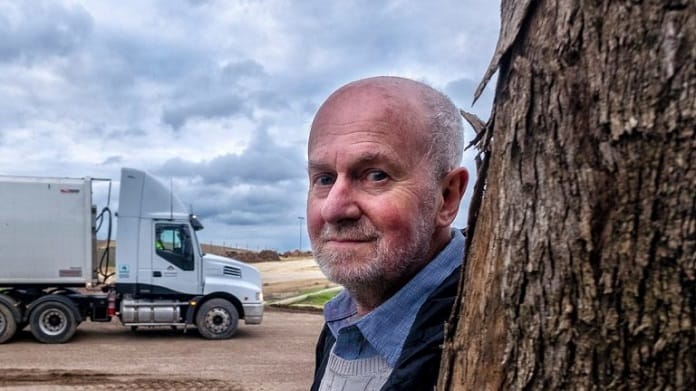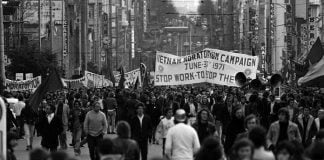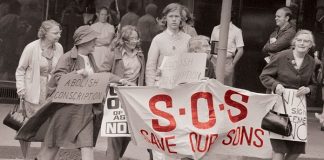Phil Griffiths pays tribute to a veteran of the anti-Vietnam War movement who never stopped fighting for justice
The left in Melbourne is mourning the death, on 8 February, of Harry van Moorst, shortly after his 75th birthday. For more than 50 years, he helped lead a series of major campaigns, and was central to many significant victories—over conscription, against Australia’s murderous war in Vietnam, and against plans to build a toxic waste dump in the outer Melbourne suburb of Werribee.
Harry was one of the first people I met when I turned up for my first Orientation Week at Melbourne University in March 1969. I was angry about the war and conscription, which hung over every young man’s head as a threat to our lives and futures.
Like so many others, I had also been inspired by the radicals of the student movement, by Albert Langer at Monash Uni and in particular by the way he had dragged into the open the instructions given to police when Albert was prosecuted for supposedly “attempting to incite a riot”.
At Melbourne Uni, that meant joining Students for a Democratic Society, the radical student group that Harry had founded just the year before.
A group of SDS members had rented a large, former hotel at 57 Palmerston Street, Carlton, which they called the Centre for Democratic Action. Meetings were held there, leaflets written and run off on Gestetner machines, a cheap, basic and finicky way of printing.
Harry’s leadership of SDS was built on his absolute conviction that the war was a crime, his growing understanding of politics, and his quiet and respectful way of interacting with everyone.
In the months before uni started that year, SDS had started a campaign against a Melbourne City Council by-law, 418, which banned the handing-out of leaflets in the city. It was, the council pretended, to protect shoppers from harassment.
Part of the SDS campaign was civil disobedience: handing out leaflets, getting arrested, making the by-law a political issue to build opposition to it, and to point out its real purpose: to silence the critics of the government and the war. By O Week that year, Harry had already spent time in jail for leafleting.
This was my first demo. A small group of us gathered in what later became City Square, opposite the Town Hall, and started leafleting. We were soon joined by Dr Jim Cairns, then the Deputy Leader of the Labor Party in federal parliament, and the leader of the left nationally. To my astonishment, as soon as Cairns started leafleting, he was arrested and carted away.
That was the beginning of the end of the by-law. The left wing “rebel unions’ took a stand, threatened the council with industrial action, and by Easter we had won.
Underground
Harry went on to help found the Draft Resisters Union in 1970, again helping lead some of the most significant actions against conscription. These involved draft resisters going underground, and then appearing in public defying and embarrassing the police and government.
This tactic worked because the movement built mass rallies of thousands of students and sometimes workers that prevented the police from arresting them.
The high point of this movement came in September 1971 when the DRU, with Harry’s leadership, set up a “resistance commune” in the student union building. The most provocative part of the commune was the establishment of a radio station, Radio 3DR, to broadcast anti-war material and the voices of the underground draft resisters.
The ruling class were hysterical, not least because the signal from Radio 3DR interfered with the signal from one of the major commercial radio stations.
The climax came on 30 September when 150 police raided the student union, refused the university’s offer of keys to open the building and smashed their way in, where they were confronted by hundreds of students and staircases filled with chairs, blocking their way.
Two of the draft resisters had already been taken away, the other two remained inside the building, hidden in an alcove, with the police unable to find them. In true police tradition, they responded by smashing up the building.
The three Vietnam moratoriums are rightly famous in our anti-war history. At Melbourne Uni, for the first moratorium, Harry coordinated a mass rally that then marched into the city to join the main protest of some 80,000 people and played a major role in the following two rallies.
The many obituaries and messages of condolence that have come out in the week since Harry’s death give a sense of the strong and sustained nature of his activism since the anti-war days.
He led an occupation of the Melbourne University Council chamber demanding child care services in the mid-1970s. He was involved in the sustained, mass campaign against the Hamer government’s plan to build a gas-fired power station at Newport in Melbourne’s west.
This was both an environmental threat to people living in the area, and an attempt to break the industrial strength of the Latrobe Valley power workers. Our side lost that struggle.
Toxic
Harry went on to become an academic and continue activism in the western suburbs of Melbourne. His most notable campaign there was against a Kennett government plan to build a toxic waste dump in Werribee.
Harry drew together a wide-ranging collection of local people to fight the proposal, initially through the proper channels. But he also knew that the odds were stacked against them, so their committee also planned for protest action if the waste dump was approved.
They ran a major political campaign through the local community against the proposal, informing people of the risks involved and attacking the company for proposing it. Everyone was told, if the decision went against them, there would be a mass rally at the local racecourse a few days later.
That rally attracted 15,000 people, shocking the government and the media.
The movement set up pickets at the proposed site and won support from Trades Hall and the building unions to ban construction. They ran a political campaign through Melbourne against the government, and the company, CSR. They won a smashing victory.
Harry’s commitment to social and community activism, his skill and patience in bringing people together to campaign, his gentle manner and his respect for everyone will be sorely missed.
Some of Harry’s work and words have been captured over the years through interviews. An “educational” video about the toxic waste dump campaign, Community Action and the Environment, is built around interviews with Harry.
And interviews he did for the documentary, Hell No, We Won’t Go (about conscription for Vietnam) are on the website of the Australian War Memorial.





